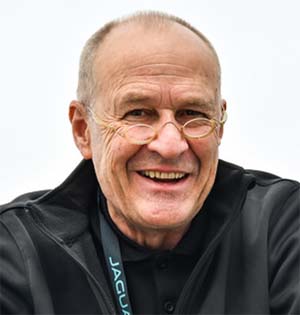Jordan Grand Prix remains one of Formula One’s most beloved privateer teams, known for its underdog status, flamboyant leadership, and remarkable achievements. Founded by the late Eddie Jordan, the team nurtured future champions, secured stunning victories, and left a legacy that continues today as Aston Martin.
 By Graham Duxbury
By Graham Duxbury
Before Jordan Grand Prix entered F1, Eddie Jordan had already made a name for himself in motorsport. A former driver, he founded Eddie Jordan Racing in 1980, competing in junior single-seater categories.
By the mid-1980s, the team was a force in the Formula 3000 (F3000) championship, then a crucial steppingstone to F1. This experience laid the foundation for Jordan’s ambitious entry into F1 in 1991.
Unlike manufacturer-backed teams, Jordan entered F1 as a privateer, relying on sponsorship deals and customer engines. Funding was a constant challenge, but Eddie’s business acumen and showmanship helped the team punch above its weight.
Their debut season in 1991 was impressive, with the Jordan 191 regularly scoring points and finishing fifth in the Constructors’ Championship. However, financial pressures forced a switch to Yamaha engines in 1992, leading to struggles on track.
A crucial sponsorship deal with Sasol, a South African energy company, secured funding from 1992 to 1994, allowing the team to develop further. Engine supplier changes continued, with Jordan switching to Hart in 1993 and Peugeot in 1995.
Despite challenges, the team secured its first double-podium finish at the 1995 Canadian GP, with Rubens Barrichello and Eddie Irvine finishing second and third.
A move to the distinctive bright-yellow colour scheme highlighting sponsorship from the Benson & Hedges cigarette brand followed in 1996. The scheme became the team’s trademark and Eddie tells the story of how he persuaded the DHL logistics company to sponsor the Jordan team and switch from a red-on-white logo to red-on-yellow so that DHL would complement the B&H branding. DHL to this day retains its distinctive red-on-yellow branding.
The team continued to progress, with new drivers and improved performances. In 1998, Jordan made a significant leap by signing world champion Damon Hill, who, alongside Ralf Schumacher, secured Jordan’s maiden F1 victory with a famous 1-2 finish in the rain-soaked Belgian GP. This triumph helped Jordan finish fourth in the Constructors’ standings.
The 1999 season was the team’s most successful, with Heinz-Harald Frentzen winning the French and Italian GPs and finishing third in the Drivers’ Championship. Jordan also placed third among constructors, its best-ever result.
However, 2000 proved more difficult, with the team dropping to sixth in the Constructors’ title.
Jordan secured a works Honda engine deal in 2001, leading to consistent points finishes and another fifth-place Constructors’ finish. In 2003, a switch to Ford engines brought struggles, but Giancarlo Fisichella claimed an unexpected victory at the rain-affected Brazilian GP after a post-race FIA inquiry.
By 2004, financial difficulties mounted, and Jordan finished second-last in the standings. With Ford selling engine supplier Cosworth, Jordan faced an uncertain future.
Although Toyota stepped in as an engine supplier in 2005, Eddie Jordan sold the team to Midland Group for $60-million. The Jordan name disappeared in 2006 as the team became Midland MF1 Racing, then Spyker F1 in 2007, and Force India in 2008.
Under Vijay Mallya’s ownership, Force India evolved into a strong midfield contender. After financial troubles led to its acquisition by Lawrence Stroll in 2018, the team transformed into Racing Point.
In 2021, it was rebranded as Aston Martin, bringing Jordan Grand Prix’s lineage full circle as a manufacturer-backed F1 outfit.
One of Jordan’s most enduring contributions to F1 was giving a young Michael Schumacher his debut at the 1991 Belgian GP. Schumacher stunned the paddock by qualifying seventh, leading to a swift move to Benetton, where he launched his legendary career. Despite losing Schumacher, Jordan had made a lasting impact on F1 history.
Jordan Grand Prix may no longer exist in name, but its spirit lives on through Aston Martin. From its humble F3000 beginnings to F1 victories, the team embodied the essence of a privateer operation driven by passion, resilience, and entrepreneurial flair.
Eddie Jordan’s leadership, remarkable sponsorship deals, and talent-spotting skills cemented Jordan Grand Prix as one of the most cherished teams in F1 history.
